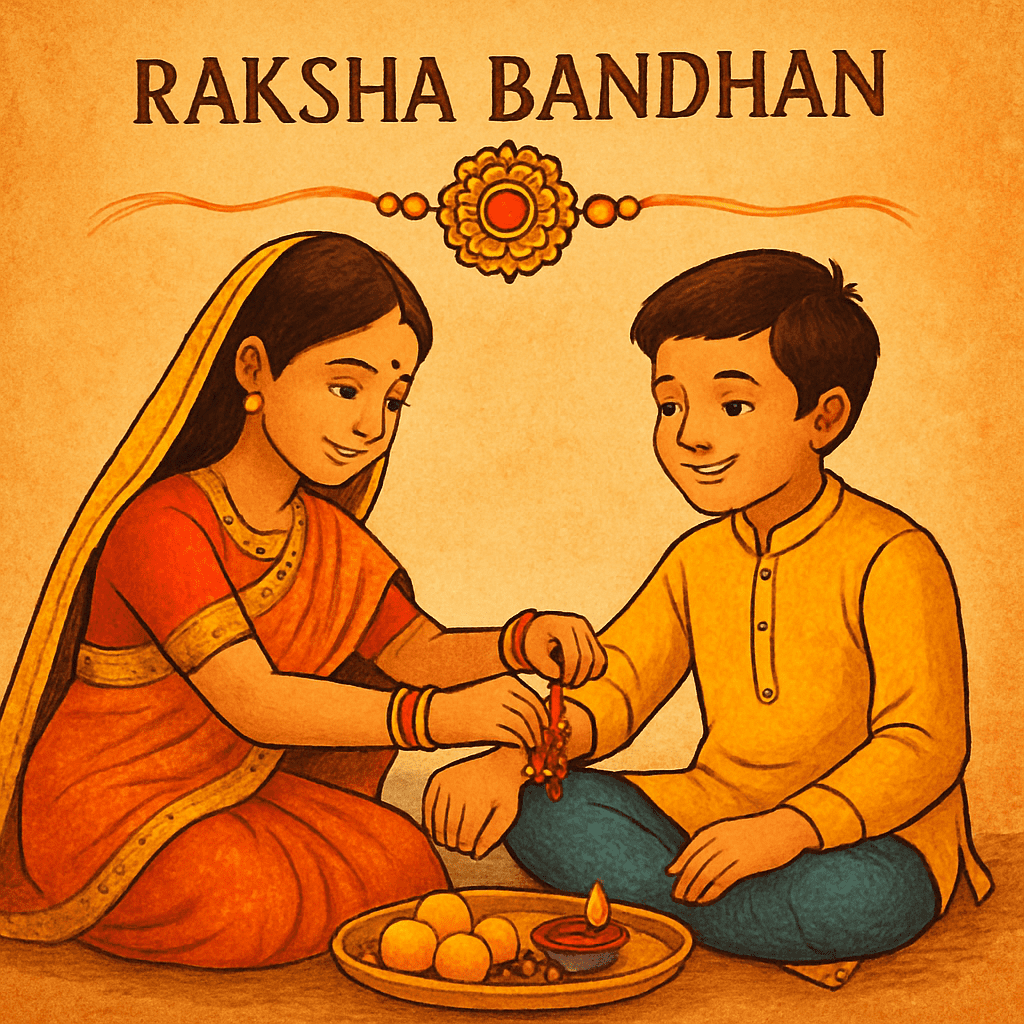Raksha Bandhan: Celebrating the Sacred Thread of Love and Protection

Celebrate the bond of love and protection this Raksha Bandhan. Discover traditions, gift ideas, and heartfelt messages to honor your siblings.
Trending News Fox, “Fast. Fierce. First on the Story.”
Digital Desk Team, Kolkata
Edited by Saibal Bose
Raksha Bandhan: Celebrating the Sacred Thread of Love and Protection
In the vibrant tapestry of Indian festivals, Raksha Bandhan shines with a unique emotional hue. It is a day dedicated to honouring the sacred and loving bond between brothers and sisters. This festival is celebrated annually on the full moon day of the Hindu lunar month of Shravana.
It is more than a mere ritual. It reaffirms the timeless promise of protection, affection, and duty. As the festival approaches, families across India and beyond prepare for the celebration. This beautiful expression of sibling love will occur on Tuesday, August 19, 2025.
The Essence and Origins of the Festival
The term “Raksha Bandhan” is derived from Sanskrit, where ‘Raksha’ means protection and ‘Bandhan’ means bond. At its core, the festival is about a sister tying a sacred thread, or ‘Rakhi’, on her brother’s wrist. This thread is not just a simple piece of silk. It is a powerful symbol of her love. It shows her prayers for his well-being. In return, the brother offers her a gift and, more importantly, a solemn vow to protect her from all harm.
The roots of Raksha Bandhan are steeped in mythology and history, with several legends illustrating its significance:
- Lord Krishna and Draupadi: The most famous tale comes from the epic Mahabharata. During a battle, Lord Krishna injured his finger. Seeing him bleed, Draupadi, the wife of the Pandavas, immediately tore a strip from her saree and tied it around his finger to stop the bleeding. Touched by her gesture, Krishna promised to protect her whenever she was in need. Years later, he fulfilled this promise. He miraculously extended her saree to save her from being disrobed in the Kaurava court.
- King Bali and Goddess Lakshmi: According to the Bhavishya Purana, Lord Vishnu won the three worlds. He won them from the demon King Bali. King Bali asked him to stay in his palace. Goddess Lakshmi, Vishnu’s consort, wished for him to return to their abode, Vaikuntha. She disguised herself as a Brahmin woman and approached King Bali, tying a Rakhi on his wrist. When Bali asked what she wanted in return, she revealed her identity and her wish. Honouring the sacred thread, King Bali requested Lord Vishnu to return.
- Rani Karnavati and Emperor Humayun: A well-documented historical account from medieval India tells of Rani Karnavati of Chittor. When her kingdom was threatened by the Sultan of Gujarat, she sent a Rakhi to the Mughal Emperor Humayun. Humayun was in the middle of another military campaign. He was so moved by the gesture that he abandoned his conquest. He rushed to her aid, honouring the implicit promise of the Rakhi.
The Modern Celebration
While the essence remains the same, the celebration of Raksha Bandhan has evolved. The day begins with preparations, with markets bustling with colourful Rakhis, traditional Indian sweets (mithai), and gifts.
The ceremony is a heartwarming affair. The sister prepares a puja thali (a plate of offerings). It typically holds the Rakhi and a diya (lamp). It also includes kumkum or roli for the tilak (a mark on the forehead), rice grains (akshat), and sweets. She first applies the tilak on her brother’s forehead. Then, she performs an aarti to ward off evil. Next, she ties the Rakhi on his right wrist. Finally, she offers him sweets. The brother, in turn, gives her a gift and his blessings.
Today, the festival has beautifully expanded its horizons:
- Sisters tie Rakhis on their cousins’ wrists.
- The “Lumba Rakhi” tradition is popular in the Marwari community. It involves a sister tying a Rakhi not just to her brother but also to her sister-in-law (Bhabhi). This act celebrates and strengthens the new familial bond.
- People tie Rakhis to those who protect them, like soldiers, police officers, and even political leaders.
- In a progressive shift, many celebrate the festival as a symbol of mutual love and protection. Sisters tie Rakhis for each other. Brothers also tie a thread for their sisters.
Raksha Bandhan is more than just a festival. It is a celebration of the intricate, supportive, and loving relationships. These relationships form the bedrock of family life. It’s a day when a simple thread weaves a powerful story of love, duty, and an unbreakable bond.
Classic Raksha Bandhan Songs
These timeless songs have been staples of the festival for decades. They are known for their heartfelt lyrics. They also feature classic melodies.
- “Bhaiya Mere Rakhi Ke Bandhan Ko Nibhana” (from Chhoti Bahen, 1959): This song is sung by the legendary Lata Mangeshkar. It is arguably the most iconic and emotionally resonant Raksha Bandhan song.
- “Phoolon Ka Taron Ka Sabka Kehna Hai” (from Hare Rama Hare Krishna, 1971): This song beautifully captures the innocence. It also highlights the affection of a sibling bond. You’ll often hear both the male and female versions of this track.
- “Behna Ne Bhai Ki Kalai Se Pyar Bandha Hai” (from Resham Ki Dori, 1974): This song is sweet and simple. It perfectly expresses the love a sister has for her brother. It also conveys the prayers she holds for him.
- “Mere Bhaiya Mere Chanda” (from Kaajal, 1965): This is a touching song from a sister’s perspective. The classic is full of love and admiration.
Modern & Newer Songs
For those who want to add some contemporary flair to their playlist, these songs are great choices. They still celebrate the spirit of Raksha Bandhan.
- “Dhaagon Se Baandhaa” (from Raksha Bandhan, 2022): This newer song is sung by Arijit Singh and Shreya Ghoshal. It has quickly become a favorite. The song is loved for its emotional lyrics and beautiful melody. It focuses on the unbreakable promise of the rakhi.
- “Tera Yaar Hoon Main” (from Sonu Ke Titu Ki Sweety, 2018): It’s a song about friendship. It also highlights the theme of unconditional love. The idea of being there for someone no matter what makes it a perfect fit for a brother-sister relationship.
Happy Raksha Bandhan!
Here are a few ways to express your wishes, whether for a sibling or a friend:
For a Sibling
- “Happy Raksha Bandhan to my first best friend! Thanks for always having my back. I love you!”
- “I’m so lucky to have a sibling like you. Thank you for all the laughs and for always protecting me. Happy Rakhi!”
- “No matter where life takes us, our bond will always be special. Wishing you a very happy Raksha Bandhan!”
For a Friend
- “Happy Raksha Bandhan! Our friendship is one of the strongest bonds in my life. Thank you for always being there for me.”
- “To a friend who is like a sibling, happy Rakhi! Thanks for all the support and guidance over the years.”
- “Sending you warm wishes on Raksha Bandhan. Our friendship is a treasure I cherish deeply.”
What do you think is the best way to celebrate Raksha Bandhan?
Frequently Asked Questions (FAQ)
1. What is the literal meaning of Raksha Bandhan?
The term translates from Sanskrit to “the bond of protection.” ‘Raksha’ means “protection” and ‘Bandhan’ means “to tie” or “bond.”
2. When is Raksha Bandhan in 2025?
Raksha Bandhan is celebrated on the full moon day (Purnima) of the Shravana month. In 2025, it falls on Tuesday, August 19th.
3. Is there a specific time to tie the Rakhi?
Yes, traditionally, families consult the Hindu calendar (Panchang). They do this to find the most auspicious time, known as the ‘Shubh Muhurat’, to carry out the ceremony. Nonetheless, the most important aspect is the sentiment. It is often performed at the family’s convenient time.
4. Can only brothers and sisters celebrate this festival?
No, the festival has evolved to include all forms of protective and loving relationships. It is common for it to be celebrated between cousins or close friends. It can also be celebrated symbolically between a citizen and a protector like a soldier.
5. What is a Lumba Rakhi?
A Lumba Rakhi is a special, more decorative Rakhi that a woman ties on the bangle of her sister-in-law (Bhabhi). It signifies the strengthening of the bond with her brother’s wife. The Lumba Rakhi welcomes her as an integral part of the family.
6. Do brothers give sisters a gift?
Yes, it is a customary part of the ritual. After the sister ties the Rakhi, the brother gives her a gift as a token of his love and appreciation. This can range from money and clothes to jewellery and modern gadgets.
Tags:
#RakshaBandhan #Rakhi #IndianFestival #BrotherSisterBond #HinduFestival #Family #Tradition #CultureOfIndia #Rakhi2025 #SiblingLove #IndianCulture
Discover more from Trending News Fox
Subscribe to get the latest posts sent to your email.




